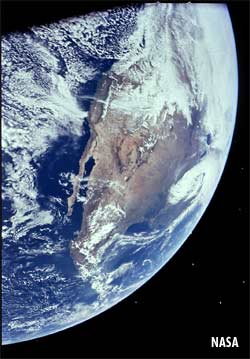Battery-Powered Balancing Robot DIY STEM Kit
$9.99$4.95
 Now that we have access to space, the easiest way to prove the Earth is spherical is to leave it and view it from a distance. Astronauts and space probes have done just that. Every picture of
Earth ever taken shows only a circular shape, and the only geometric solid which looks like a
circle from any direction is a sphere.
Now that we have access to space, the easiest way to prove the Earth is spherical is to leave it and view it from a distance. Astronauts and space probes have done just that. Every picture of
Earth ever taken shows only a circular shape, and the only geometric solid which looks like a
circle from any direction is a sphere.
 'There is no inductive method which could lead to the fundamental concepts of physics. Failure to understand this fact constituted the basic philosophical error of so many investigators of the nineteenth century.'
'There is no inductive method which could lead to the fundamental concepts of physics. Failure to understand this fact constituted the basic philosophical error of so many investigators of the nineteenth century.'